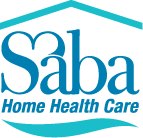
24-Hour Live-In Care
Our caregivers can provide overnight assistance with activities of daily living, medication administration, transportation, and companionship. We can also provide live-in home care for people with dementia, Alzheimer’s, and other chronic conditions.
Skilled Nursing Services
Saba offers convenient, all-in-one home healthcare, providing skilled nursing and private duty care wherever it’s needed. Our services, accessible with or without insurance, are delivered by a team of experienced RNs, LPNs, and certified home health aides.
Personal Home Care Services
Our personal home care services are designed to help individuals live independently, safely, and comfortably at home. Our home health aides assist with activities of daily living such as dressing, bathing, grooming, feeding, exercise, and personal hygiene. We also provide medication administration, light housekeeping, and transportation assistance, ensuring the best care for your loved ones.
Short Term Transitional Care
Our services can help you or a loved one recover from hospitalization or a rehabilitation facility, and can include skilled nursing care, companion care, and personal care. We can also help with basic needs such as dressing, personal hygiene, light housekeeping, companionship, family respite, and ambulation. These services can be scheduled on a part-time basis throughout the week.
Alzheimer’s and dementia care services
We understand the unique challenges of Alzheimer’s and dementia care. Our caregivers manage symptoms and adjust care as needed, creating a comfortable environment that respects each individual’s preferences and interests. Regular feedback from family members helps us match your loved one with the right caregiver, reducing stress and anxiety.
Home Hospice Care
If you or a loved one are facing a life-limiting illness, consider home hospice care. Compassionate home hospice care services in Ocean and Monmouth Counties, NJ provide personalized medical care, emotional support, and assistance with daily tasks – all in the comfort of home. Explore eligibility, insurance coverage, benefits, and our personalized approach.
Pediatric Home Care Services
Medical assistance for children at home, school, or any needed location. Personalized care plans, including skilled nursing, personal care, respite care, and more.
We prioritize the well-being and stability of the child while supporting their families. From disease management to wound care, experienced nurses ensure high-quality care and collaborate with doctors for personalized treatment plans.
Respite Care Services
Short-term relief for family caregivers. We assist with household tasks, companionship, transportation, and personal care, allowing caregivers to take a break and focus on their well-being. We offer personalized activities and prioritize the comfort and safety of their clients.
Companion Care
Companion care services for individuals who need assistance with daily tasks. We help with medication reminders, light housekeeping, meal preparation, companionship, and more. We prioritize the well-being, dignity, and safety of their clients. Services are available on an hourly or live-in basis, and they customize care plans to meet the unique needs of each individual.
Fall Prevention Program
Falls can lead to serious injuries, especially among older adults. Our Fall Prevention Program aims to minimize the risks and injuries from falls, providing a safer environment for your loved ones.
For more information or to schedule a consultation, contact Saba Home Health Care, where we prioritize creating a secure and supportive environment for all our clients. Let our family take care of your family with the expertise and compassion you deserve.
